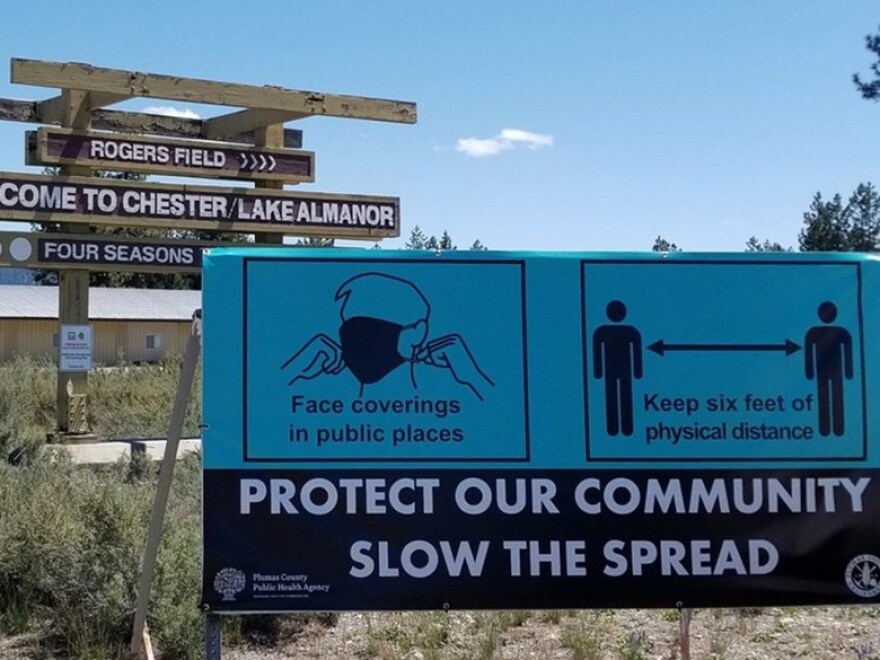When you drive into Sierra County, a bright yellow sign blares in all caps, “VISITORS, KINDLY DISTANCE FROM OUR COMMUNITIES."
A one-lane bridge crosses the North Yuba River in the town of Downieville, which is in the middle of the Tahoe National Forest. And about 110 miles northeast of Sacramento and about 90 miles west of Reno, it’s lined with old brick and wood frame buildings.
In the middle of town, Carl Butz is trying to figure out how to keep a mask on, carry on a conversation, and smoke a cigarette. A couple of locals are giving him a hard time.
“It’s over my nose," he says. "It’s always been just a fashion statement anyway.”
He’s kidding. But he and half the town of 200 are wearing them. He’s 72 and at greater risk of infection.
Butz publishes the Mountain Messenger, the oldest weekly paper in the state.
‘People are frightened of having people like yourself come up here," he says during this interview. "You know, outsiders.”
Residents who live in areas of California that haven’t been hit hard by COVID-19 are facing a challenge: How do you reopen the economy when tourists — or people from places where there are many more cases of coronavirus — are your number one source of revenue?
One case could lead to others, and with a town the size of Downieville, that could bring trouble for everyone. And that’s the quandary.
“We like the tourists. We live off the tourism," Butz says. "But at the same time, no one wants to get ill.”
The thought of tourists sounds great to Jay and Gailene Elliott. They just opened the Boomtown Lounge wine and beer bar. Gailene says right now, it’s to-go orders only with a snack.
“We have a salami, cheese, olive cracker plate for five teeny weeny bucks, and then we have a tamale and salsa and chips plate for five bucks," she says.
They feel like they’re now locals, but they still drive up every weekend from Sonoma County to work on their business. They have 100 masks from the county and don’t want to be the source of an outbreak.
“We’ve been asking people to wear masks. We’ve been given about 100 masks from Sierra County and they’re all individually wrapped with a little thing of hand sanitizer," Gailene says. "So as soon as someone walks up without a mask or even if I see them going to the store next door without a mask, I yell at them, ‘Would you like a mask?’"
She didn’t have to yell at Bob Macomber. He lives 35 miles away in Graeagle and is meeting his son’s family here before they go camping at one of the sites that just opened.
He and his wife Carol are wearing masks and keeping their distance, but that guard’s coming down when their family gets here from Rocklin and they head off to go camping.
“When you get grandchildren it’s hard not to give them a hug," Macomber says.
He thinks both families have been responsible about social distancing.
“There’s no guarantees in life, but we’re trying not to make any stupid decisions,” he says.
Up the road outside the town of Beckwourth, Gary Romano of Sierra Valley Farms and Romano's Certified Farmers Market opened the only farmers market in Plumas County a couple weeks early. Some of the vendors are from out of the area. Large white X's mark the spot where they set up, and arrows tell people what traffic pattern to follow.
He thinks it’s safer than the store.
“The grocery store, it seems like we have a lot of interaction," he says. "You have no choice but to cross paths. Here we have open air. Nothing is handled by the customer.”
At Leonard’s IGA in Portola, Charles Scoville is standing on an X in the parking lot with a black print mask on his face, but he works at the Dollar General.
"It's been busy busy busy," he says. “Nobody stays home. Nobody cares.”
Normally Jeffrey’s Pub & Grub over in Quincy would be busy, too, and noisy. But today you can hear every word of the conversation between the owner and her two customers. It’s been only four days since the county allowed Anna Jeffrey to reopen. She says no matter what the health orders are, they won’t please everyone.
"You’re not going to get it where everybody’s happy," she says. "There’s always going to be somebody who’s not happy with whatever we end up doing. I am all for the tourists coming back. I am all for being a tourist again. I want to go places. I want people to be able to come here.”
Whether it be Sierra or Plumas County the masks have to come off at some point. The question is what will happen when they do.
Copyright 2020 CapRadio


